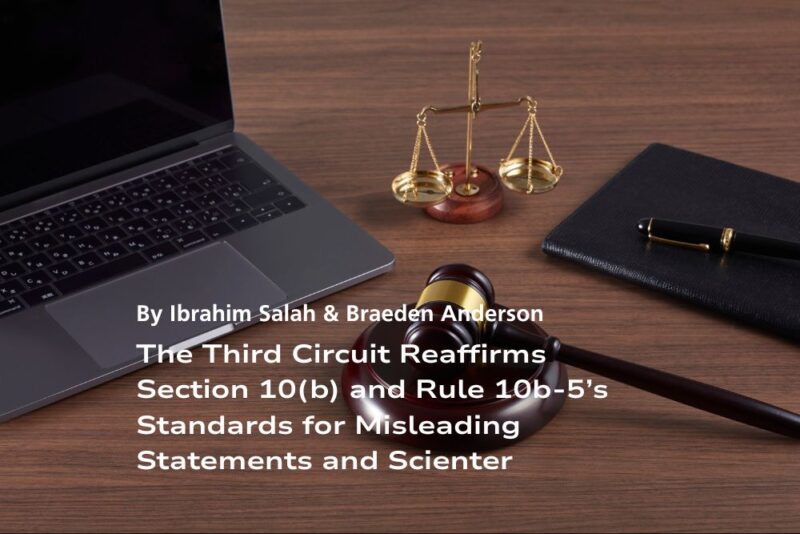
By Aaron Kriss
On July 4, 2025, President Trump signed into law the One Big Beautiful Bill Act (the “OBBBA”), which has introduced major changes to the U.S. Internal Revenue Code (the “IRC”). Many of these changes extend President Trump’s 2017 tax cuts that were set to expire, and the OBBBA also includes new tax cuts and deductions that could impact you and your business going forward. The OBBBA also brings in massive changes for how tips and overtime pay are taxed– that issue is addressed in a separate client alert HERE.
What does these tax changes mean for your business?
When it comes to your business, there are a number of key takeaways from the tax changes set forth in the OBBBA. Below are the relevant takeaways that could result in significant tax implications.
- Preservation of Pass-Through Entity Tax (“PTET”) Deduction – Pass-through entities such as S corporations, limited liability companies, and partnerships may continue to pay stateand local taxes (“SALT”) at the entity level rather than at the individual level. PTET is typically deductible from federal income tax and is exempt from the SALT cap (described below). Maintaining the PTET deduction will likely continue to provide relief to businesses in high-tax states and will provide stability and predictability as businesses can continue to benefit from this deduction as in prior years.
Contact Us Today
- Research and Development (“R&D”) Expenses – R&D expenses for research conducted in the U.S. can now be deducted for costs incurred after December 31, 2024. Beginning after December 31, 2021, small businesses (under $31 million average gross receipts in the past 3 years) can amend their tax returns from such prior years to expense domestic R&D costs and claim a tax return for each applicable prior year. R&D expenses for research conducted outside of the U.S. still must be amortized over 15 years.
- Section 179 Deduction Cap – Section 179 of the IRC allows for deductions for investments in certain qualified equipment and other assets, subject to a deduction cap. Effective January 1, 2025, the Section 179 deduction cap will increase from $1,000,000 to $2,500,000 with a phase-out threshold of $4,000,000 for property placed in service after December 31, 2024. As a result, businesses can immediately deduct the cost of qualifying equipment and property rather than having it depreciate over time. This will particularly benefit capital-intensive industries such as manufacturing and construction, where large equipment purchases are common.
- Bonus Depreciation – Effective January 19, 2025, businesses can immediately deduct the full cost of qualifying property (such as equipment, machinery, and software) placed in service after the date of purchase.
- Business Interest Deduction – From January 1, 2025 through December 31, 2029, businesses may deduct interest expenses using a 30% cap based off a company’s EBITDA (earnings before interest, tax, depreciation, and amortization) rather than EBIT (earnings before interest and tax). This could result in higher interest expense deductions, especially for capital-intensive businesses that have substantial depreciation and amortization expenses.
- Clean Energy Credits – For companies in the clean energy industry, tax credits for wind and solar facilities will be reduced by 20%, and effective January 1, 2026, the clean vehicle credit will be repealed.
How may these changes affect you personally as a business owner?
The OBBBA may also impact you on an individual level as a business owner as described below.
- Key Provisions Made Permanent
- The OBBBA keeps the top individual income tax rate of 37% permanent (in the absence of the OBBBA, this rate would have reverted to 39.6%).
- The OBBBA also permanently removes the overall limitation on itemized deductions. However, this is replaced with a new limitation which generally capsthe benefit of an itemized deduction at 35% (even if a taxpayer’s highest marginal income tax rate exceeds 35%).
- The prohibition of “miscellaneous itemized deductions” is made permanent.
- The so-called standard deduction is permanently increased, standing at $31,500 in 2025 for married couples filing jointly ($15,750 for single filers).
- Qualified Small Business Stock (“QSBS”) – For C corporation stock issued after July 4, 2025, the aggregate gross asset value cap for determining whether the company constitutes qualified small business for purposes of IRC Section 1202 has been increased from $50,000,000 to $75,000,000. The OBBBA also increases the amount of excluded gain from any sale of QSBS to the greater of $15,000,000 or 10 times the tax basis per taxpayer. Lastly, the gain from any sale of QSBS will be excluded from income based on a new tiered system for the holding period. Stockholders holding their shares for at least: (i) 3 years get a 50% exclusion, (ii) 4 years get a 75% exclusion, and (iii) 5 years get a 100% exclusion. This is a significant expansion of the QSBS benefit; please contact us with further questions as to how this may impact you.
- SALT Deduction Cap – For tax years 2025 through 2029, the SALT deduction cap has been raised from $10,000 to $40,000 (increasing 1% annually), subject to a phase-out for taxpayers with an adjusted gross income of $500,000 or more ($250,000 for individual taxpayers). The cap will revert to $10,000 beginning in 2030 with no phaseout. As a result, this increased cap may provide significant tax relief to taxpayers in high-tax states, though the issue is likely to rear its head again in another four years.
- Estate and Gift Tax Exemption – Effective as of January 1, 2026, the estate and gift tax exemption will permanently increase to $15,000,000 per individual and $30,000,000 for married couples to address inflation.
- Qualified Business Income (“QBI”) Deduction for Pass-Through Entities – Beginning on January 1, 2026, the 20% QBI deduction for pass-through entities will now be permanent. The phase-out thresholds have been increased to $75,000 for individuals and $150,000 for married couples, and there is a new minimum $400 deduction for taxpayers with QBI of at least $1,000.
- Excess Business Loss (“EBL”) Limitations – The EBL limitation limits the aggregate amount of business losses that a taxpayer can deduct against nonbusiness income. For the tax year of 2025, the EBL limitation thresholds are $313,000 for individuals and $626,000 for married couples. Any losses exceeding these thresholds are not deductible in the current year but can be treated as net operating losses for future years.
Gesmer Updegrove will continue monitoring developments related to the OBBBA and its tax implications. In the meantime, if you have any questions about the foregoing matters, or the OBBBA generally, please contact Attorney Aaron Kriss.
Meet the Author
Check Out Our Latest Publications
- SEC CHAIR OUTLINES PLAN TO BRING CLARITY TO DIGITAL ASSET OVERSIGHT

- CRYPTO TAX: YEAR-IN-REVIEW

- The Third Circuit Reaffirms Section 10(b) and Rule 10b-5’s Standards for Misleading Statements and Scienter

- SEC Chairman Paul Atkins Announces Updates to Wells Process

- SEC Policy Update: Coordinated Review of Settlements and Waivers Restored

- SEC Provides Key Update on Treasury Clearing Rule Implementation

